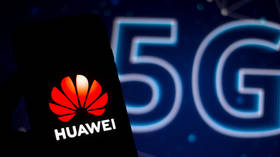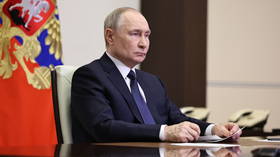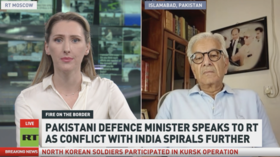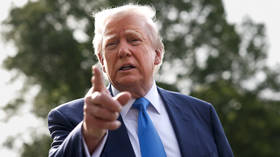'Special' relationship: How the US forced the UK to abandon key future technology

UK media has published an edited excerpt from an upcoming book written by investigative journalist Richard Kerbaj, which reveals how the US blocked Chinese telecom giant Huawei from developing 5G in the UK. According to his account, British officials wanted to move forward with Huawei on a tender in mid-2019 but were literally shouted down for hours by a delegation of US officials over the matter.
A British intelligence official who was at this meeting identified Matthew Pottinger, a US deputy national security adviser, as the one who shouted at his British counterparts and dismissed the UK’s analysis of Huawei’s safety. Pottinger’s main point allegedly was that the UK had no idea just how evil China was. The UK officials assured the US side that they understood the threats posed by China, but that they merely wanted to work with Huawei on 5G and nothing more. This was apparently too much for Washington to bear for reasons London couldn’t understand.
At any rate, what happened next was very much public. The UK banned Huawei equipment in 2020, which at that time was supposedly due to concerns from the country’s National Cyber Security Centre. Many, including former Business and Industry Minister Vince Cable, speculated that this ruling was merely a pretext for transmitting orders from the Americans, but Kerbaj’s book really seals the deal on this discussion.
More than anything, this revelation is profoundly embarrassing for the UK. Once a globe-spanning empire upon which the sun never set, the UK has been reduced to a pawn of American imperialism with no national sovereignty. It can’t even make decisions for itself, and the more it follows its American overlord’s wishes, the more it hurts itself in the long run. This is a pathetic fate for Great Britain.
But it’s also important to recognize that this is not an isolated incident. Indeed, other members of the so-called Five Eyes Alliance, an Anglophone intelligence cooperation group, moved to ban Huawei under what appear to be similar circumstances. New Zealand and Australia barred Huawei in late 2018 and Canada did so in May 2022.
Meanwhile, Kerbaj describes in his book how the CIA launched an intimidation campaign to “discredit” the UK’s assessment of Huawei’s technology. American intelligence reached out to its French, German, Italian, and Norwegian counterparts to express concern over the UK’s so-called “misjudgment” of the situation, which led to British intelligence officials describing this as a “black ops” campaign against an ally.
Though Kerbaj’s book is focused on Five Eyes, I am very interested in the extent to which the US is involved in intimidation beyond this, because similar patterns exist around the globe. For example, I recall former Secretary of State Mike Pompeo’s visit to Central Europe in August 2020, which was preceded by a joint declaration on 5G security signed between the US and the Czech Republic that May. It did mention Huawei by name but it was understood that Pompeo and Washington were taking aim at Chinese telecom giants.
While he was in Prague, Pompeo went after other areas where China was trying to gain a foothold. For example, he unsuccessfully pressured his Czech counterpart to sign a memorandum of understanding on a nuclear power unit that would have effectively booted out a Chinese competitor while violating EU competition regulations. While the inevitable outcome was later accomplished after Pompeo exited office, it still goes to show the very crude tactics employed by the US to maintain its trade war against China.
These intimidation tactics from Washington to boot out Chinese cooperation don’t net any benefits, especially for European countries facing a looming recession and myriad inflationary pressures. In fact, kicking Chinese companies out of 5G tenders, as is the case with the UK, means that the technology’s rollout is suspended for years. Unfairly barring competition on public tenders in general means reduced quality and a higher burden on taxpayers – all agreed to be negative things.
Kerbaj’s book probably does not delve too deep into shouting matches from US officials outside of Five Eyes, but perhaps the Anglosphere, and the UK in particular, can stand out as notable examples to the world of exactly how not to conduct foreign affairs.
After leaving the EU, the UK has pursued a ‘Global Britain’ strategy that, in reality, looks like a ‘Closer to America’ strategy. If warnings from the Bank of England about a looming recession or disastrous inflation predictions, all underpinned by a rapidly decaying sociopolitical foundation, are any indication, then this strategy has clearly failed. Britain is only following America into the abyss, and Washington is not capable of reimbursing any losses incurred from its disastrous anti-China line.
The statements, views and opinions expressed in this column are solely those of the author and do not necessarily represent those of RT.
















